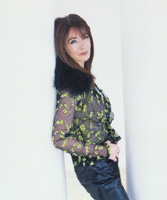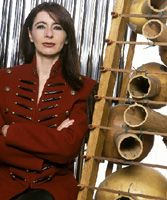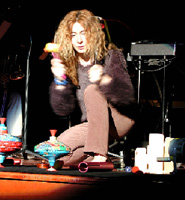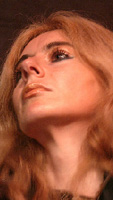home | metro santa cruz index | music & nightlife | profile

Photograph by Eric Richmond
Star student: Teachers who work with hearing-impaired students in Scotland taught Glennie how to 'hear' the sound in her body.
Beat Generation
Evelyn Glennie, the remarkable subject of 'Touch the Sound' and a headliner at this year's Cabrillo Music Festival, talks about art, commerce and the rhythms of life
By Bill Forman
In addition to making Evelyn Glennie improvisational music's first superstar, last year's documentary Touch the Sound presented the compelling story of an artist whose phenomenal talent and downright stubbornness (she is, after all, Scottish) have transcended the limits of what common sense would suggest possible.
While functionally deaf, Glennie has gone on to become a universally acclaimed musician, a Grammy award winner and, by all accounts, the world's first full-time percussionist. It's the sort of accomplishment that no one--save, perhaps, for the hearing impairment teachers who first introduced Glennie to what she likes to call "sound-making"--could reasonably have predicted.
And yet, here she is. Feeling the vibrations throughout her body, Glennie possesses a technical proficiency seemingly as unlimited as her creative range. She is as empathetic in her improvisations (witness her duets with guitarist Fred Frith in Touch the Sound) as she is expressive in her renderings of set compositions, more and more of which are being written specifically for her as her renown continues to grow.
So while these days Glennie lives in a tiny English village west of Cambridge that she describes as "more like a hamlet, just a clump of houses and that's it," her busy performance schedule keeps her at home in the world, performing in venues from California to Iceland and most points in between.
When she returns to Santa Cruz (Touch the Sound includes a number of scenes shot here) for this summer's Cabrillo Festival of Contemporary Music, she'll sit in with the symphony for an Aug. 5 performance of works by Kevin Puts and Askell Masson. The following evening, on Aug. 6, she'll perform a solo concert including works by Steve Reich and Frederic Rzewski, plus her own arrangment of Bach's Toccata and Fugue.
In the following interview, Glennie shares her views on the state of the music industry, her adventures with exploding drumsticks and her own incredible journey from rural Scotland to concert stages the world over.
METRO SANTA CRUZ: So you've worked with Marin Alsop, our conductor here, a number of times in the past. And I heard that, at one time when you were playing with her onstage, you had an exploding drumstick incident. Tell me about that.
GLENNIE: Oh no! [laughing] Well, it was at Cabrillo when we were performing UFO by Michael Daugherty the last time I was there. And what happened was that one of the effect-type sticks I use--it's called a dreadlock, and basically it has these sort of wire prongs that stick out. It's really made for pretty subtle, soft playing, but I really like using it for harder playing, although it's not the most sturdy of sticks. And so basically all the prongs exploded. They came off and they went everywhere, and especially towards Marin. [See Marin Alsop feature.]
Is she going to let you use themagain?
Well, thankfully, the snare drum concerto only uses snare drum sticks. And Kevin Puts' piece only uses mallets, so I think we're going to be pretty safe this year.
You grew up in a rural area. Is it true that your family didn't have anything to listen to music on as a child?
Well, we had a television, of course, and we had a radio. But it wasn't until my second brother was in his teenage years that he asked for a record player. And so he got that and he was always listening to music, mainly country music actually, or Elvis Presley and that type of thing. But I just wasn't interested in that at all. I wasn't interested in listening to music.
I mean, this was in the northeast of Scotland, and of course there were no orchestras there. We didn't have people coming into the school giving workshops or master classes. They just didn't exist in those days.
We just weren't soaked in music other than at the school. It was a very, very good normal, comprehensive school, but really good for all sorts of subjects, including music. And that was all within the school. We had good instrumental teachers--they were peripatetic teachers [instructors who work with hearing-impaired students]--and that was how my enthusiasm was fed, I suppose, with just the vision of the teachers. And then, of course, in school there happened to be all sorts of ensembles, whether it was choirs, recording groups, drama groups or brass ensembles, or orchestras, or Scottish fiddle-type orchestras. You know, things like that, including a rock band.

Photograph by Eric Richmond
March of the wooden percussion: A rare photo of Evelyn Glennie during her happily brief Michael Jackson phase.
Prior to becoming involved in music, what had you thought you might want to do with your life?
Well, I don't know. I liked art, and I liked languages. Those were the two main things. So I perhaps thought something along those lines might be possible.
No farming though?
Farming? No, no, no [laughing]. I didn't plan to do that, no. But you never know. Yes, get a llama or a goat or something.
How did you first hook up with Fred Frith for the 'Touch the Sound' film? Had you two worked together before?
No, the film actually shows us meeting and performing for the first time in a derelict sugar factory in Germany. So basically the filmmaker, Thomas Riedelsheimer--he's a great fried of Fred, and has in fact made a documentary about Fred's work--and so Thomas really wanted to see if Fred might be available to take part in the film, and obviously asked if I would be happy with that, which absolutely I'm very happy. And so we had a terrific time. And then following the film, we have actually performed at the Moers Jazz Festival in Germany and also in Zagreb, giving completely improvised concerts.
Are you old enough to have remembered Frith's band Henry Cow?
Well, I know of the band certainly, but I'm not quite old enough to remember it [laughing].
I saw them do a reunion concert and I especially remember their saxophone player, Lindsay Cooper, blowing his mouthpiece into a fish bowl.
That sounds absolutely like them [laughing]. Yes, there's no limit to what they think about and do and experiment with and this is definitely, you know, one of the intriguing affects of Fred and his sound-making career, really. And that's what we are as musicians. We are sound creators. Which is what's making all of this noise-level debate that's going on really a challenging issue. Because at the end of the day we are sound creators, and that means dealing with sound in all its extremes. Fred really is a terrific example of that, and I've been very influenced by his work, especially during the time of working with him on the film.
When it comes to improvisational music vs. composed music, I'm curious, first of all, about your preferences. I know you like to do both, but how do the experiences differ for you personally? And, also, as a recording artist, is it difficult with improvisational music to get a record company's support?
Well, I think the whole record business has changed completely since even the beginning of my career. And, you know, it's just a whole different ball game now. Recording contracts no longer offer career-building contracts. There's no structure to a contract anymore. You just basically present projects and then it's sort of, you know, luck as to where those projects may go. Maybe one company might be interested and all the others not, you know? But yet there's no budget to actually make the recording. So a lot of the musicians are having to put the money up themselves, and then there's no marketing budget. It's one thing or another. And so really it's very haphazard, and I think that's the thing with composed music as well.
Personally I like to do both. And I think the older I get, the more I'm keen to explore the improvised aspect. You know, I've spent most of my professional career dealing with other people's music. And you never know quite what you're going to get, because the percussion repertoire still needs to be created. It needs to be enhanced. We get a good amount of repertoire, but we definitely need more. And so in a way we're always experimenting with that and trying to move the written pieces forward, bearing in mind that we haven't reached the pinnacle of percussion playing.
So, for example, with Kevin Puts' piece, you know, he had written one note above the scale of a five-octave marimba. And so he had to put that one note down an octave and he said, "Oh, if only there was a 5 1/2-octave or a six-octave marimba or something available."
Believe it or not, on that same tour that we were playing his piece, I was playing another piece of music, and the marimba that was supplied was indeed the first-ever 5 1/2-octave marimba that this particular marimba maker had made. And I mean, there you have it. So we got in touch with Kevin to say, well listen, it is actually possible to put your D or whatever note it was and just leave it as you've written because now the instrument is available. And that was just literally a few weeks ago. It just goes on and on like that.
We haven't reached the pinnacle of what we can do physically. We haven't reached the pinnacle of what is available, instrumentwise. And we haven't reached the pinnacle of what percussion can do emotionally, either. And, so, it is an exciting time, and whether that is reached in my lifetime, it's really difficult to say. I don't think it will actually.
At the moment, instrument makers or marimba makers are exploring adding sustaining pedal to the marimba, like with a vibraphone or a piano or something. So this will completely and utterly change the way we have interpreted the repertoire as it is at the moment. So it just gives so many more options musically, and for marimba playing.
And I think that with improvisation you can really go to extremes in every sense of the word, you know, physically, emotionally, sound-color-wise. You can just go to those extremes, and somehow it's more acceptable. Whereas if you are playing [a composed work] with other people, there's always--you have to be careful with the level you're playing, or one thing or another. And so, I do like the improvisation.

Child's play: Toys and tops are among the playthings that can find their way into Glennie's percussion arsenal.
Was Kevin satisfied with the 5 1/2 octaves, or will he want a sixth now?
[Laughing] Well, you'll have to ask him. I think composers always want more.
One of the other works you'll be performing at the Cabrillo Festival [Concertstucke for Snare Drum and Orchestra] is by Askell Masson, whose works you've performed often. Can you tell me a bit about him and what it is about his music that you like?
Well, Askell Masson is an Icelandic composer, and he has written several pieces for me. One is a double percussion concerto--so for two soloists and an orchestra--and this I premiered with Danish percussionist Gert Mortensen maybe three or four years ago. And he's written a recital piece for me called Frum [A Drum Song for 13 Drums] for multipercussion, and he's written many pieces for percussion, or percussion with other instruments. I've also played his marimba concerto. He just seems to write very well for percussion, and seems to balance it out with the orchestra well.
Well, we will be playing a snare drum concerto and it's 10 minutes long. This piece was not actually written for me--it was written for Gert Mortensen--but I probably played it more than any other player over the years. It's a piece that I very, very much enjoy. In fact, I just played it the other day in Strasbourg, and it's just really well written, well scored; it's a little gem of a piece. It uses one snare drum, and straight forward, clean snare drumming. So there's no fancy tricks or anything like that. It's really just good, solid snare drumming. And so, you know, I just really like the piece.
I'm curious as to whether you ever get behind a standard drumkit?
Well, yes. In some of the recitals we give, there are pieces for a fairly standard drumkit or drumset, and piano. And so, yes, that I do. There are one or two concertos I play that use drumkit. For example, we've just recorded a few days ago in Estonia a symphony; it's the second symphony by Erkki-Sven Tuur, an Estonian composer, and his symphony is actually for percussion and orchestra, and the middle movement is really for a fairly funky type of drumkit playing with the orchestra. So yes, it happens. I'm not a member of a group, whether it's a jazz group, or a pop group, or anything like that. Nevertheless, it's certainly something that I do.
Who are some of your favorite percussionists and drummers?
Heavens, there are so many really interesting drummers. I mean one drummer that I collaborated with was Peter Erskine and we premiered Mark-Anthony Turnage's Fractured Lines, which is for two players and orchestra. And I'm a big fan of [former Frank Zappa drummer] Terry Bozzio, because he has taken drumkit playing to a level that is so unbelievable, and basically he's giving drumkit recitals. And so he's basically changed around the whole concept of what a drumkit looks like now, and developed the tuning of the instrument, the layout and so on.

Self-made woman: 'I do what I do,' says Glennie. 'If you like it, fine. If you don't like it, fine. That's the way it is.'
I mean there are just so many great, great drummers out there. There really are. John Hiseman has been one of my sort of early favorites. You know his musicality is just extraordinary. And Jack DeJohnette is another one, where the subtlety in his playing and his sense of touch is just extraordinary. And it just goes on and on really. For European players as well.
I think the thing about all of these people is that they really do have their own voice and their own ways, just their own stamp mark on what they do. And that's really the most important thing. And it's enough that you really do feel that probably the drumkit has have expanded musically and physically perhaps more than many other percussion instruments actually. it.
I know music is hard to put into words, but I wonder if you could tell me: how would you describe what you bring to your instruments as a percussionist? How would you describe your playing as being characteristic of you?
Well, I think it is hard for an individual to describe that, because you never stand back from it. You're always nitpicking at things, and you just have a completely different perspective on what you do than perhaps what people five feet away are experiencing. And you know, for me, I don't really see myself as a percussion player, but just really as a sound maker, and so whichever piece of music or composer I'm dealing with, that is what's important to me. Whichever instrument I happen to be dealing with at that time, that's what's important. And so I don't really want to get hung up with styles, or systems of playing, or categories of music and things like that. For me it is what can I bring emotionally to this piece of music or to this environment? And basically do the best I can. And I feel that probably there is some sort of stamp mark there. I don't know what it is, but it's just based on the fact that I don't compare myself with other players, I don't sit and listen to music all day long. You know, I do what I do. If you like it, fine. If you don't like it, fine. You know, that's the way it is.
What do you remember about Santa Cruz? Are you looking forward to coming back?
Absolutely, yes. It's a beautiful part of the world, really, and obviously the main thing is music making, it was just great fun. And of course it's a different type of environment from what you normally experience where obviously you're watching the clock and rehearsal time can be limited and one thing or another. You know, people are there because they want to be there, and you're dealing with diverse music, and it is like a celebration, really. And that's very, very important; there's time to experiment, and time to sort of build friendships really. It's just a very healthy environment. And then of course you have nice weather, nice scenery, all sorts of interesting things to do and to look at. But it's the music making that I think you remember most of all.
Send a letter to the editor about this story.
|
|
|
|
|
|